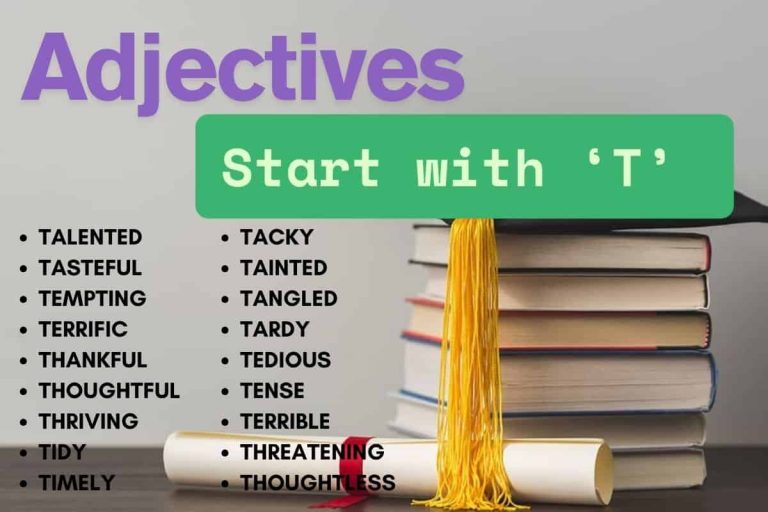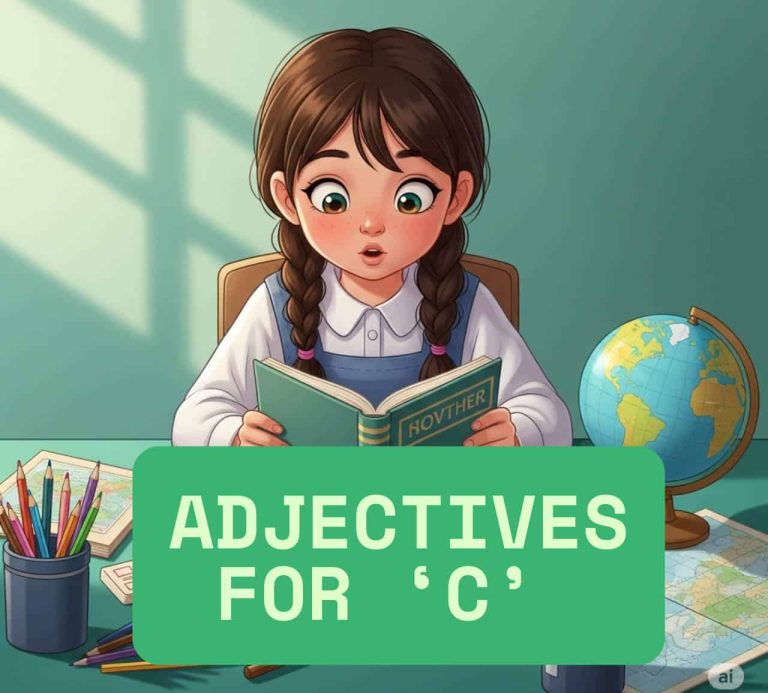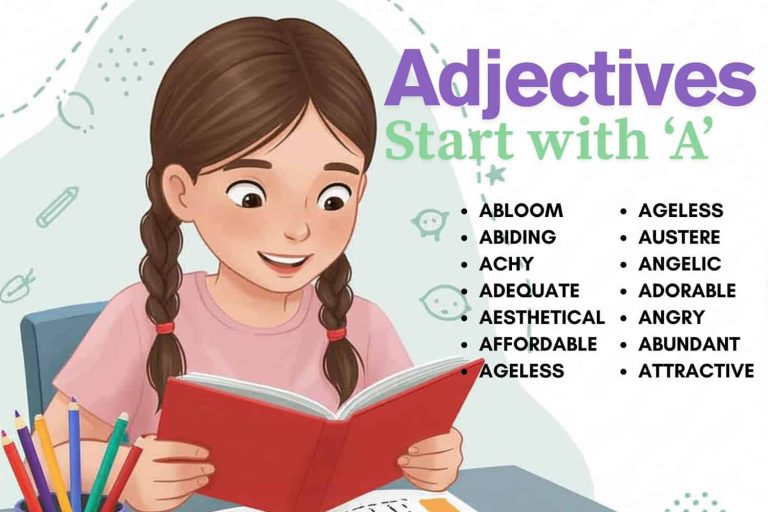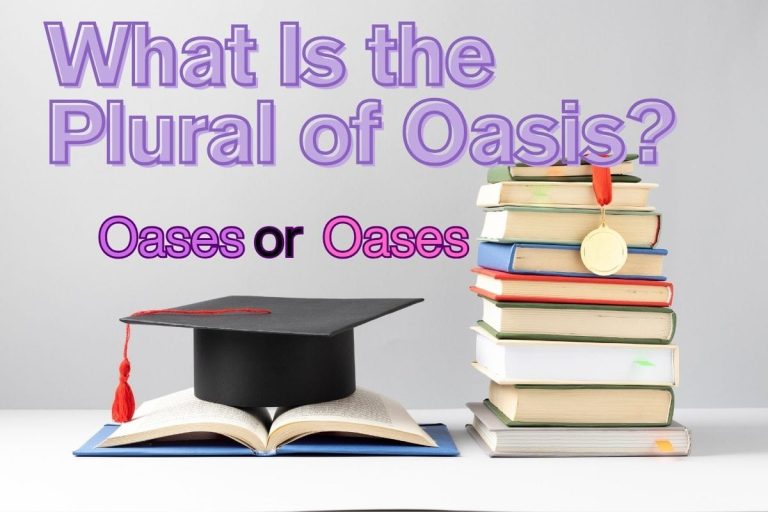Mastering Adjectives That Start With ‘V’: 50+ Examples
Adjectives that start with the letter ‘V’ may not be the most common, but they are certainly some of the most vibrant, vivid, and versatile words in the English language.
Whether you’re describing a valiant hero, a velvety texture, or a vicious storm, these adjectives bring depth, emotion, and precision to your speech and writing. They can express positivity, negativity, or neutrality — making them valuable tools for storytelling, conversation, and creative expression.
Exploring adjectives starting with ‘V’ is a great way to expand your vocabulary and add a touch of uniqueness to your descriptions. These words can help you be more specific, more colorful, and more engaging when communicating your ideas.
In this post, we’ve gathered a powerful list of ‘V’ adjectives — from commonly used ones to rare gems — along with their meanings and examples. Whether you’re a student, writer, or word enthusiast, there’s something here for everyone!
50+ Adjectives Starting with ‘V’ with Examples
Like all adjectives, those starting with ‘V’ typically precede the noun they modify. However, they can also appear after linking verbs such as be, seem, become, look, feel, and taste.
Descriptive Adjectives
Descriptive adjectives provide details about the physical characteristics, appearance, or qualities of a noun. They help create a more vivid and detailed image in the reader’s mind.
| Adjective | Example Sentence |
|---|---|
| Vast | The vast desert stretched out before them, seemingly endless. |
| Velvety | She loved the velvety texture of the rose petals. |
| Verdant | The verdant hills were a welcome sight after the long journey. |
| Vivid | The artist used vivid colors to capture the energy of the scene. |
| Voluminous | The library contained a voluminous collection of ancient texts. |
| Vertical | The climber scaled the vertical rock face with ease. |
| Visible | The stars were barely visible through the city lights. |
| Vitreous | The sculpture had a vitreous, glass-like finish. |
| Vocal | The bird was very vocal in the early morning. |
| Vacant | The vacant lot was overgrown with weeds. |
| Venomous | The snake was venomous and dangerous. |
| Variable | The weather was variable, changing from sun to rain in minutes. |
| Vaulted | The cathedral had a vaulted ceiling that soared high above. |
| Veiled | The woman’s face was veiled in shadow. |
| Ventilated | The room was well-ventilated, with fresh air circulating. |
| Versed | He was well-versed in classical literature. |
| Vestibular | The dancer had excellent vestibular control. |
| Viable | The plan was viable, with a good chance of success. |
| Vigilant | The security guard was vigilant, always watching for trouble. |
| Viral | The video went viral and was seen by millions. |
| Visceral | The painting evoked a visceral reaction in the viewer. |
| Visual | The presentation included many visual aids. |
| Voguish | The style was very voguish at the time. |
| Void | The contract was declared void due to a legal technicality. |
| Volatile | The political situation was volatile and unpredictable. |
Evaluative Adjectives
Evaluative adjectives express judgments, opinions, or assessments about the noun being described. They indicate whether something is considered good, bad, useful, or important.
| Adjective | Example Sentence |
|---|---|
| Valuable | Her advice was valuable and helped him make the right decision. |
| Valid | His argument was valid and supported by evidence. |
| Virtuous | She was known for her virtuous character and integrity. |
| Visionary | The company’s founder was a visionary leader. |
| Vital | Water is vital for all living things. |
| Versatile | The actor was known for his versatile performances. |
| Voracious | He had a voracious appetite for knowledge. |
| Vivacious | She was a vivacious and energetic person. |
| Verbose | The report was too verbose and needed to be more concise. |
| Vexing | The problem was vexing and difficult to solve. |
| Victorious | The team was victorious after a hard-fought game. |
| Vigilant | The neighborhood watch was vigilant in protecting the community. |
| Violent | The storm was violent and caused widespread damage. |
| Virulent | The disease was highly virulent and spread quickly. |
| Voluble | The speaker was voluble and talked for hours. |
| Voluntary | Her work was voluntary and unpaid. |
| Vulnerable | The elderly are more vulnerable to the flu. |
| Vacillating | He was vacillating between two options. |
| Vain | She was very vain about her appearance. |
| Venal | The corrupt official was venal and easily bribed. |
| Veritable | He was a veritable genius. |
| Vestigial | The appendix is a vestigial organ. |
| Vicarious | She lived a vicarious life through her children. |
| Vintage | The car was a vintage model from the 1950s. |
| Worthy | He was a worthy opponent. |
Quantity Adjectives
Quantity adjectives indicate the amount or number of the noun being described. While fewer adjectives starting with “V” directly express quantity, some can imply a sense of amount or degree.
| Adjective | Example Sentence |
|---|---|
| Vague | The instructions were vague, making it difficult to understand what to do. |
| Venal | The venal politician accepted bribes to pass the legislation. |
| Verifiable | The data was verifiable through multiple sources. |
| Violable | The treaty was violable, leading to renewed conflict. |
| Voidable | The contract was voidable due to misrepresentation. |
| Vulgar | His language was vulgar and offensive to many people. |
| Valorous | The valorous knight defended the kingdom with bravery. |
| Vanishing | The vanishing rainforests are a major environmental concern. |
| Variable | The variable interest rates made it difficult to budget. |
| Vegetative | The patient remained in a vegetative state after the accident. |
| Velar | The velar consonant is produced at the back of the mouth. |
| Venerable | The venerable professor was respected by all his students. |
| Ventricular | The cardiologist examined the patient’s ventricular function. |
| Vermilion | The sunset painted the sky in vermilion hues. |
| Vestmental | The priest wore vestmental robes during the ceremony. |
| Veterinary | The veterinary clinic provided care for the animals. |
| Vexatious | The legal proceedings were vexatious and time-consuming. |
| Viatic | The traveler received a viatic allowance for his journey. |
| Vibrational | The physicist studied the vibrational modes of the molecule. |
| Victimless | Some argue that certain crimes are victimless. |
| Videotaped | The confession was videotaped as evidence. |
| Viewable | The document was viewable on the company’s intranet. |
| Villainous | The villainous character plotted to take over the world. |
| Vinaceous | The bird had vinaceous plumage. |
| Vinyl | The record was pressed on vinyl. |
Usage Rules for ‘V’ Adjectives
Using adjectives correctly involves understanding their placement in a sentence, their comparative and superlative forms, and any specific rules that apply to certain adjectives. Here are some key rules for using ‘V’ adjectives:
- Placement: Adjectives typically come before the noun they modify. However, they can also follow linking verbs.
- Comparative and Superlative Forms: Most ‘V’ adjectives form their comparative and superlative degrees using “more” and “most,” especially if they are longer words. For shorter words, “-er” and “-est” can be used. For example:
- Valuable: more valuable, most valuable
- Vague: vaguer, vaguest
- Coordinate Adjectives: When using multiple adjectives to describe a noun, separate them with commas if they are coordinate (i.e., they modify the noun independently). If they are cumulative (i.e., one adjective modifies the combination of the others), do not use commas.
Example of Coordinate Adjectives: She had a vibrant, exciting personality. (Both adjectives independently describe her personality.)
Example of Cumulative Adjectives: He drove a vintage sports car. (Vintage modifies the combination “sports car.”)
Understanding these rules will help you use ‘V’ adjectives accurately and effectively.
Common Mistakes with ‘V’ Adjectives
Even experienced English speakers sometimes make mistakes with adjectives. Here are some common errors to avoid when using ‘V’ adjectives:
- Incorrect Placement: Placing the adjective in an awkward or grammatically incorrect position in the sentence.
- Misusing Comparative and Superlative Forms: Incorrectly forming the comparative or superlative degree of the adjective.
- Using the Wrong Adjective: Choosing an adjective that doesn’t accurately convey the intended meaning.
Table 4: Correct vs. Incorrect Usage
| Incorrect | Correct | Explanation |
|---|---|---|
| The colors vibrant were beautiful. | The vibrant colors were beautiful. | Adjectives typically precede the noun they modify. |
| This is the vaguest answer. | This is the most vague answer. | “Vague” is often uses “most” in the superlative. |
| He is a valuable person. | He is a valued person. | “Valuable” means worth a lot, while “valued” means appreciated. |
By being aware of these common mistakes, you can avoid them and use ‘V’ adjectives with greater confidence and accuracy.
Practice Exercises
Test your understanding of ‘V’ adjectives with these practice exercises. Fill in the blanks with the appropriate adjective from the word bank provided.
Exercise 1: Fill in the Blanks
Word Bank: vague, valuable, vast, versatile, vital
- The desert was so ________ that it took days to cross.
- Her contributions to the team were incredibly ________.
- Water is ________ for survival.
- The actor was known for being ________.
- The instructions were ________, so I didn’t know what to do.
Answer Key:
- vast
- valuable
- vital
- versatile
- vague
Exercise 2: Choose the Correct Adjective
Select the correct adjective from the options provided to complete the sentence.
- The (viral/viable) marketing campaign helped the company reach a wider audience.
- The (venerable/venal) professor was respected by all his students.
- The (vivid/vacant) colors of the painting made it stand out.
- He had a (voracious/voluntary) appetite for reading books.
- The (volatile/valid) political situation made it difficult to predict the future.
Answer Key:
- viral
- venerable
- vivid
- voracious
- volatile
Exercise 3: Sentence Completion
Complete the following sentences using an appropriate adjective that starts with the letter ‘V’.
- The garden was ________ with flowers of all colors.
- The ________ storm caused significant damage to the coastline.
- She was a ________ speaker, captivating the audience with her words.
- The old book had a ________ cover, worn with age.
- The ________ plan was unlikely to succeed.
Possible Answer Key (Many answers are possible):
- vibrant
- violent
- voluble
- velvety
- vague
Advanced Topics: Nuances and Collocations
For advanced learners, understanding the nuances and collocations of ‘V’ adjectives can further enhance their language skills. Collocations are words that frequently appear together.
Knowing common collocations helps you use adjectives more naturally and effectively.
Examples of collocations with ‘V’ adjectives:
- Vast majority: Used to describe a large proportion of something.
- Visionary leader: Used to describe a leader with innovative ideas.
- Valuable asset: Used to describe something that is highly beneficial.
- Vivid memory: Used to describe a clear and detailed recollection.
- Volatile market: Used to describe a market that is subject to sudden and unpredictable changes.
Understanding these nuances and collocations allows you to use ‘V’ adjectives with greater precision and sophistication.
Frequently Asked Questions (FAQ)
Here are some frequently asked questions about adjectives starting with ‘V’:
- What is the difference between “valuable” and “valued”?“Valuable” means having great worth or importance, often in terms of monetary value or usefulness. “Valued” means highly regarded or appreciated. For example, “The antique is valuable” means it is worth a lot of money, while “He is a valued employee” means he is highly appreciated by the company.
- How do I know when to use “more” and “most” versus “-er” and “-est” for comparative and superlative forms?Generally, shorter adjectives (one or two syllables) use “-er” and “-est,” while longer adjectives (three or more syllables) use “more” and “most.” However, there are exceptions, and some two-syllable adjectives can use either form. When in doubt, “more” and “most” are often safer choices, especially for formal writing.
- Can an adjective starting with ‘V’ also be used as a verb or noun?Yes, some words that can function as adjectives starting with ‘V’ can also function as a verb or noun, depending on the context. For example, “void” can be an adjective (a void space), a noun (an empty space), or a verb (to void a contract). Understanding the context is key to determining the word’s function.
- Are there any ‘V’ adjectives that have negative connotations?Yes, several ‘V’ adjectives have negative connotations. Examples include “vacant” (empty, lacking), “vague” (unclear, imprecise), “venal” (corrupt, easily bribed), “violent” (forceful, destructive), and “vulgar” (crude, offensive). It’s important to be aware of these connotations when choosing an adjective to ensure you convey the intended meaning.
- How can I expand my vocabulary of ‘V’ adjectives?Reading widely, using a dictionary or thesaurus, and practicing using new words in sentences are all effective ways to expand your vocabulary. Pay attention to how native English speakers use ‘V’ adjectives in speech and writing, and try to incorporate them into your own communication.
- What is the difference between “viable” and “valid”?“Viable” means capable of working successfully; feasible. For example, “a viable solution.” “Valid” means (of an argument or conclusion) having a sound basis in logic or fact; reasonable or cogent. For example, “a valid argument.”
- What is the best way to remember the meanings of different ‘V’ adjectives?Using flashcards, creating mnemonic devices, and using the words in context are all helpful strategies. Try to associate each adjective with a specific image or situation to make it more memorable. The more you use the words, the better you will remember them.
Conclusion
Remember to practice regularly and pay attention to how native speakers use these words in context.
Continue to explore new adjectives and incorporate them into your vocabulary. The more you expand your word choices, the more effective and engaging your communication will become.
Use the resources and exercises provided in this article as a starting point, and continue to build your vocabulary and language skills over time.






